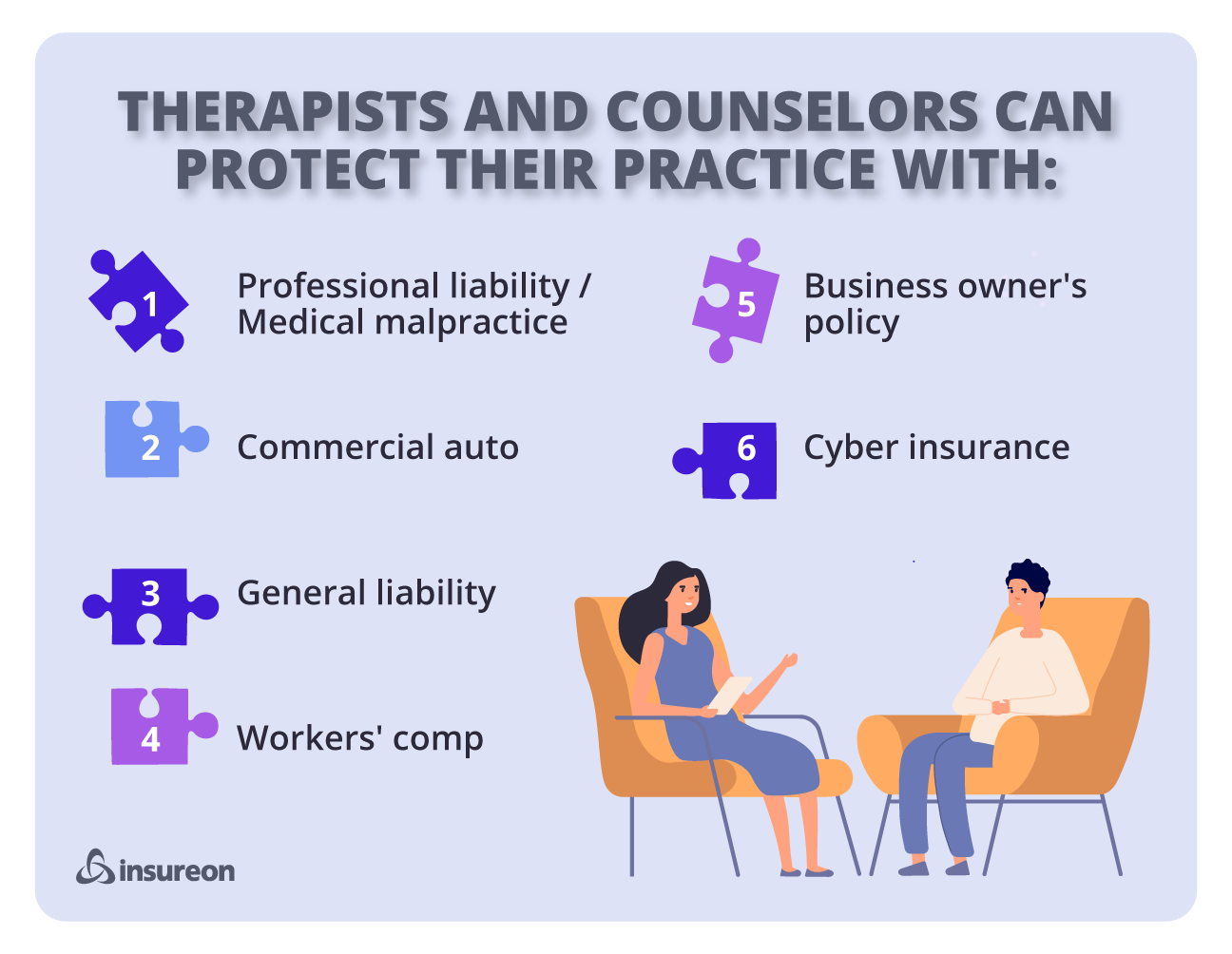
Top therapists and counselors we insure
Recommended insurance policies for therapists and counselors
From family therapy to wellness counseling, your business can survive a lawsuit with insurance for counselors. Gain peace of mind and financial protection against legal costs and accidents with policies for your specific risks.
Professional liability / medical malpractice
This policy can pay for legal defense costs if a therapist or counselor is sued for negligence that led to injury or financial loss. It's sometimes referred to as malpractice insurance.
- Accusations of negligence
- Failure to deliver results
- Mistakes and oversights
General liability insurance
This policy covers common therapy and counseling risks, including client bodily injuries. Bundle it with property insurance for savings in a business owner’s policy, or BOP.
- Slip-and-fall accidents
- Damaged client property
- Libel and slander lawsuits
Business owner’s policy
A BOP bundles commercial property insurance and general liability coverage in one plan. It's often the most cost-effective type of business insurance for therapists and counselors.
- Client injuries
- Damaged business property
- Business interruption incidents
Workers’ compensation insurance
Most states require workers' comp for therapy and counseling businesses that have employees. It also protects sole proprietors from work injury costs that health insurance might deny.
- Employee medical expenses
- Disability benefits
- Lawsuits from employee injuries
Cyber insurance
Cyber liability insurance covers financial losses from data breaches and cyberattacks. It's strongly recommended for any therapy clinic that stores personal information.
- Client notification costs
- Fraud monitoring services
- Data breach investigations
Commercial auto insurance
Commercial auto insurance covers the cost of an accident involving a vehicle owned by a therapy or counseling business. Most states require this coverage for business-owned vehicles.
- Property damage caused by your vehicle
- Medical bills from an auto accident
- Vehicle theft and vandalism
How much does insurance cost for therapy and counseling professionals?

A therapist who works independently will pay less for insurance than a larger clinic.
Several factors can determine therapy practice insurance costs, including:
- The therapy and counseling services you offer, such as occupational therapy
- Types of care, such as inpatient, outpatient, or telehealth
- Your business equipment and property
- Your clinic's size and revenue
- Your deductibles and policy limits
- How many employees you have

How do I get affordable therapy and counseling business insurance?
It’s easy to find affordable business insurance for therapists and counselors. Whether you work as a marriage therapist, mental health counselor, or psychologist, you’ll need to have some basic information about your business available.
Our application will ask you for your annual revenue and payroll, among other details. You can buy a policy online and get a certificate of insurance with Insureon in three easy steps:
- Complete a free online application
- Compare free quotes and choose a policy
- Pay for your policy and download a certificate for proof of coverage
Insureon's licensed agents work with top-rated U.S. insurance companies to find the right insurance plan for your business, whether you work as a contractor or own a clinic with several employees.
Verified business insurance reviews
Hear from customers like you who purchased small business insurance.
FAQs about therapy and counseling business insurance
Are therapists and counselors required to carry malpractice insurance?
State laws do not often require mental heath professionals to carry medical malpractice insurance, but it may be required by government contracts, healthcare networks, or hospitals and other healthcare facilities.
Even when you're not required to have it, malpractice coverage is a key part of risk management. A patient could sue your business for professional negligence, or malpractice, if you fail to meet a certain standard of care, or if you make a mistake that causes harm.
Because these lawsuits can be so expensive, it's recommended that every therapy and counseling business carry this type of insurance.
What other insurance coverage do therapists and counselors need?
In addition to the insurance policies mentioned above, you may want to consider the following coverage options for specialized risks:
Telehealth coverage is essential if you offer virtual counseling services or telemedicine. It extends the protection of your medical professional liability insurance policy to claims of negligence related to telehealth sessions.
License defense coverage pays for legal fees and other costs associated with defending therapists and counselors during an investigation that may result in action against their licenses. This coverage can usually be added to your professional liability policy.
Sexual misconduct defense coverage pays for legal fees if a client sues for a violation of healthcare provider-patient boundaries.
HIPAA coverage can be included in a professional liability policy to provide coverage for HIPAA violations including proceedings, fines, and penalties.
How can a counselor be held liable for negligence?
Counselors and therapists work closely with vulnerable patients, which exposes them to a wide range of malpractice lawsuits. For example, you could be held liable for negligence in the following situations:
- Failure to respond to suicidal ideation
- Failure to recognize substance use
- Sexual misconduct and other boundary violations
- Lack of documentation
- Improper diagnosis or treatment
- Medication side effects or harmful interactions
Fortunately, it's possible to reduce the risk of a lawsuit through a variety of techniques, such as clear communication with patients and family members, thorough documentation, and adherence to the standard of care for your profession.

Want free expert advice right in your inbox?
By entering your email address and subscribing, you agree to our Terms of Use and Privacy Policy
Read our blog posts


The Health Insurance Portability and Accountability Act (HIPAA) was established in 1996 to protect sensitive patient health information (PHI) from being disclosed without a patient's knowledge or...














